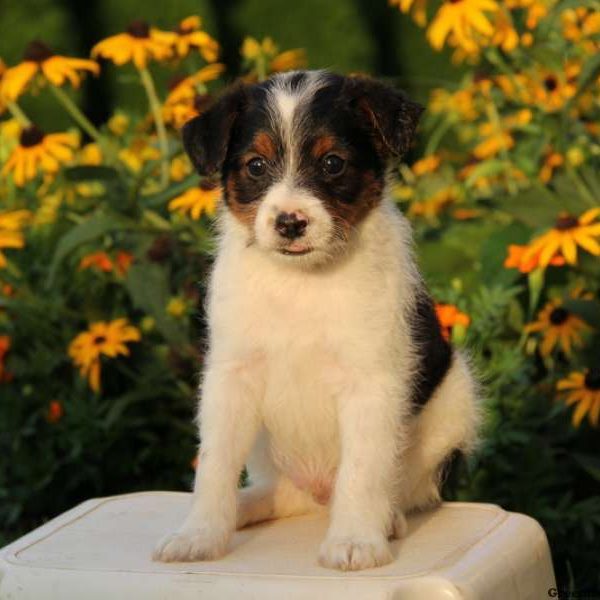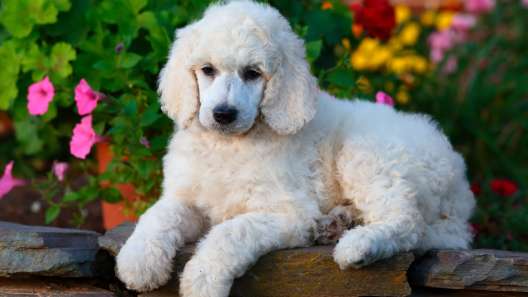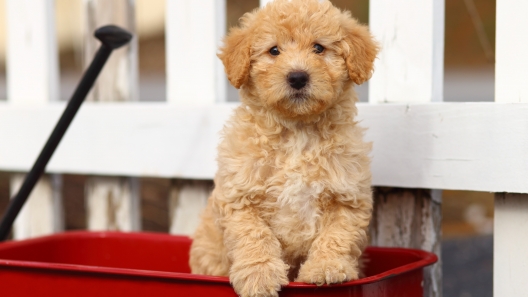
-
Activity Level:
high
-
Shedding Level:
low
-
Grooming Level:
moderate
-
Trainability:
high
-
Good for Novice Owners:
moderate
-
Adaptability:
high
-
Kid/Pet Friendly:
often
-
Prey Drive:
high
-
Watchdog:
very alert
- Average Size: Small
- Average Lifespan: 10-13 years
- Registered?: other
Foodle Dog Breed Information
Overview
Temperament
Adaptability
Health
Owner Experience
Grooming
Activity Level
Size
Life Span
Did You Know?
The Foodle is a designer dog breed that is a cross between a Fox Terrier and a Miniature Poodle. Although a mixed-breed dog can take on any combination of traits from one or both of their parents, a Foodle tends to be a small, energetic, and fluffy dog with a sweet, loving demeanor and a playful personality.
Although they are not recognized by the American Kennel Club, they are recognized by other notable dog organizations. The American Canine Hybrid Club, Designer Dogs Kennel Club, Designer Breed Registry, and more all recognize the Foodle.
Foodles tend to be energetic, spirited, and alert. They love to cuddle, love their families, and are devoted to them. They get along well with children and other dogs. They can have a high prey drive, so they may need some extra socialization and training to get along well with smaller pets in the household.
Although they tend to have an open and friendly personality, they can still be suspicious of strangers until they have been introduced. They can also be prone to barking a lot as they will alert you of animals or people near your home. Early training can help prevent this behavior from becoming a nuisance.
The Foodle is a highly adaptable dog breed. They are well-suited to homes with yards as well as smaller apartments. As long as they get enough attention, mental stimulation, and exercise, they can adapt to almost anywhere as long as they are with you.
As with any dog breed, they are sensitive to heat. Because of their small size, they may need to bundle up in some winter dog products to stay warm when the temperatures drop. Since they love nothing more than to be with their families, they do not like to be left alone for long periods of time.
Since they have can have a high prey drive, they also tend to have an urge to chase. As such, they should only be let off-leash in securely fenced areas. Even if your Foodle is well-trained off-leash, they may ignore your recall commands in favor of chasing something interesting.
Are mixed-breed dogs healthier than purebred dogs? They can be sometimes, but it’s not a guarantee. They could inherit any combination of conditions from one or both parents, all of the conditions from both parents, or none of them.
For the Foodle, potential health concerns to be aware of include luxating patella, Legg-Perthes disease, Addison’s, Cushing’s, epilepsy, and deafness. Reputable breeders will screen their dogs to prevent passing on issues, so make sure you ask about the health history of both of the parents.
As a small dog breed, they are also more prone to developing dental diseases. Gum disease in dogs is one of the most common health issues in dogs and also leads to more serious problems. So, it’s important to take good care of your dog’s teeth and to start early.
Foodles are intelligent little dogs that are eager to please and pick up things quickly. They can be a little stubborn at times and tend to be easily distracted. Despite this, they tend to be a good fit for owners of all experience levels.
Puppy training classes can still be a great idea. In addition to reinforcing the training you’re doing at home, they also help strengthen the bond you have with your puppy and also often offer opportunities to socialize a puppy.
A Foodle can inherit a Fox Terrier coat, a Poodle coat, or a coat that is truly a mix of both. If they take after their Fox Terrier parent, their coat will shed moderately year-round, require brushing a few times a week, and need only the occasional bath.
If they inherit the Poodle coat, it will be low-shedding and high-maintenance. Daily brushing and grooming every 4-6 weeks will be the minimum. Regardless of coat type and care, you will also need to care for your Foodle’s nails, ears, and teeth.
Cutting your dog’s nails once or twice monthly is usually enough to keep them from growing too long. Weekly ear checks and carefully cleaning your dog’s ears as needed can help prevent ear infections. Ideal dental care for dogs starts with brushing teeth or using an enzyme toothpaste every day.
Although they are small, Foodles are high-energy dogs. Daily walks plus playtime, time to run, and other activities are usually enough to keep this dog happy and healthy. But, your Foodle will likely be up for more activity if you are. They will often just be happy to be active and spending more time with you.
A fully-grown Foodle usually stands 10-12 inches tall and weighs 9-13 pounds
A Foodle generally lives for 10-13 years.
The Foodle is also sometimes called a Foxipoo, Foxpoo, or Foxdoodle.









